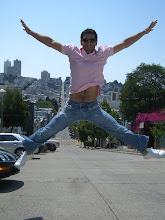
Amr Shabana (born 20 July 1979, in Cairo) is a professional squash player from Egypt. He won the World Open in 2003, 2005 and 2007, and reached the World No. 1 ranking in 2006.
PSA member since 1995, Amr claimed his first Tour title in July 1999, winning the Puebla Open in Mexico. Seven days later he grabbed his second, the Mexico Open, again beating Australia's Craig Rowland in the final.
The New Year brought continuing rewards for Shabana with victories in the Canadian Classic in January, followed by the Tournament of Champions in New York in March, and the Bermuda PSA Masters in April – bringing his PSA Tour title tally to 12.
In April 2006, Shabana became the first Egyptian player to reach the World No. 1 ranking.
In December 2007 Amr Shabana was crowned world champion for the third time in five years at the Endurance World Open in Bermuda.
You can watch him on youtube; I promise it is inspiring:
http://www.youtube.com/watch?v=BbbzLGuXaBE



